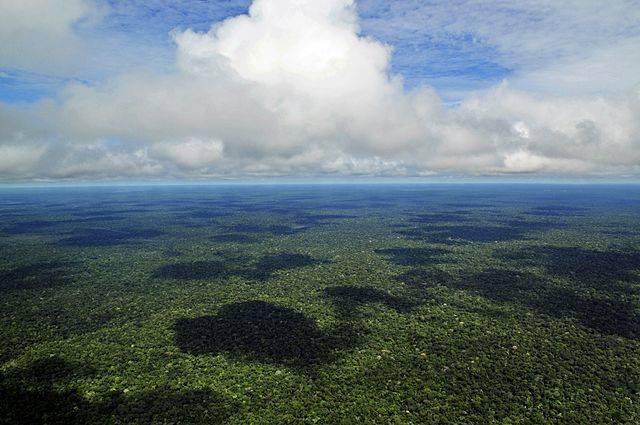
A recent study, primarily derived from an analysis of satellite photographs, alleges that soy and meat production is responsible for widespread deforestation across Brazil and Bolivia.
The result ties American food products to environmental degradation and human rights violations, according to the NGOs Mighty Earth, Rainforest Alliance and Greenpeace.
Furthermore, the political chaos in Brazil could lead to the dismantling of an agency responsible for the protection of indigenous rights – which means deforestation could accelerate in the next few years after being contained for much of this century.
Mighty Earth says an investigation of 28 locations that started last fall proves that large-scale clear cutting of forests have ties to the the large agricultural commodities firms Cargill and Bunge. In addition to either creating a market for, or turning a blind eye, to deforestation-based soy, Mighty accuses these companies of financing both land clearance and local infrastructure development.
Much of that soy, in turn, is sold to companies in Cargill’s and Bunge’s supply chains – and as a result, Mighty says companies including Burger King are selling products containing soy that are connected to illegal and unchecked deforestation.
As of press time, Burger King has not replied to TriplePundit’s request for comment. Neither Bunge and Cargil would not address Mighty's accusations directly. But they did reiterate to 3p what they say are their commitments to stopping deforestation within their supply chain.
Bunge, for example, explained its stance on deforestation in an email to 3p:
"Bunge has a clear commitment and public plan to eliminate deforestation. We are working actively, individually and in partnership with NGOs and peer companies, to achieve our goals. We are expanding traceability of our supply, collaborating to develop new systems to identify areas for suitable agricultural expansion and exploring ways to provide new incentives to farmers to avoid deforestation."
Cargill directed 3p to its forest policy. "We work alongside a number of organizations who share our goal of ending deforestation," reiterated a Cargill spokesperson by email to 3p. "Some are critical, some are supportive; but in all cases, we benefit from these interactions as we work toward a common purpose."
Last month, Bunge announced that it is committed to ending deforestation within its supply chain; Cargill has issued a similar policy. But Mighty insists these companies' public campaigns do not match its recent satellite images.
Mighty claims to have shared its research with both Bunge and Cargill. Bunge told Mighty it is monitoring the operations of its suppliers in Bolivia. Cargill denied connection to one soy plantation in the country while confirming it has sourced from another. Both suppliers have also declined to support any expansion of deforestation efforts across South America, while another competitor, ADM, says it backs such efforts.
Meanwhile, other NGOs say that both environmental degradation and land grabbing could only worsen in the coming months. In the wake of last year’s impeachment of its president, the current government in Brazil has been determined to end stringent forest protections implemented by previous administrations. A congressional commission in Brasília, with ties to the country’s powerful farming lobby, has recommended that the country’s indigenous rights agency, FUNAI, be dismantled. In addition to suggesting that this agency, largely staffed by anthropologists, be replaced with a division in the country’s national justice department, the commission also insists that 80 FUNAI officials be prosecuted for supporting “illegal” land claims by indigenous peoples.
The president of Rainforest Alliance, Nigel Sizer, attacked the policy for being destructive to both the local environment and human rights. "The Rainforest Alliance deplores the move to dismantle Brazil's indigenous affairs agency,” Sizer said in an emailed statement to 3p. “We believe that only by recognizing the rights of indigenous peoples to the land which they inhabit, will the issues of deforestation be properly addressed.”
Meanwhile in Brasília, two congressional measures that would remove protection measures from 600,000 hectares in the state of Pará are moving forward.
Greenpeace said this would only make it easier for these lands to be explored and exploited by mining, agribusiness and energy interests in the coming months, and has launched an online petition to raise awareness about the issue.
“It’s a very dark time for us,” a spokesperson from Greenpeace’s chapter in Brazil said during an an email exchange with 3p.
Image credit: Neil Palmer/Wiki Commons

Leon Kaye has written for 3p since 2010 and become executive editor in 2018. His previous work includes writing for the Guardian as well as other online and print publications. In addition, he's worked in sales executive roles within technology and financial research companies, as well as for a public relations firm, for which he consulted with one of the globe’s leading sustainability initiatives. Currently living in Central California, he’s traveled to 70-plus countries and has lived and worked in South Korea, the United Arab Emirates and Uruguay.
Leon’s an alum of Fresno State, the University of Maryland, Baltimore County and the University of Southern California's Marshall Business School. He enjoys traveling abroad as well as exploring California’s Central Coast and the Sierra Nevadas.














